In 2019, over 1.3 million Americans visited the South Pacific. This region is known for its beautiful beaches and lively cultures. It’s important to get the right vaccinations to stay healthy while traveling.
Knowing what vaccinations you need for the South Pacific is key. It lets you enjoy places like Fiji and New Zealand without health worries.
This guide will tell you about the essential vaccines for the South Pacific. It also offers health tips for your destinations. With the right preparation, you can stay healthy and have a great time in the South Pacific.
Key Takeaways
- Travel vaccines are vital for ensuring your health during South Pacific trips.
- Common vaccines include Hepatitis A and B, Typhoid, and Yellow Fever.
- Consulting with a healthcare professional can guide your vaccination choices.
- Stay updated on health advice specific to the regions you visit.
- Prioritize food and water safety to avoid common illnesses while traveling.
Introduction to South Pacific Travel Vaccines
Traveling to the South Pacific is an exciting adventure. You’ll see diverse cultures, stunning landscapes, and unique wildlife. It’s important to know the south pacific vaccination requirements to stay healthy and safe.
Each island in the South Pacific has its own health risks. Learning about the necessary travel vaccines for south pacific places can make your trip better.
Vaccines help prevent diseases you might catch while traveling. Some areas have more cases of illnesses like hepatitis or typhoid. Getting vaccinated is a smart way to protect yourself and others.
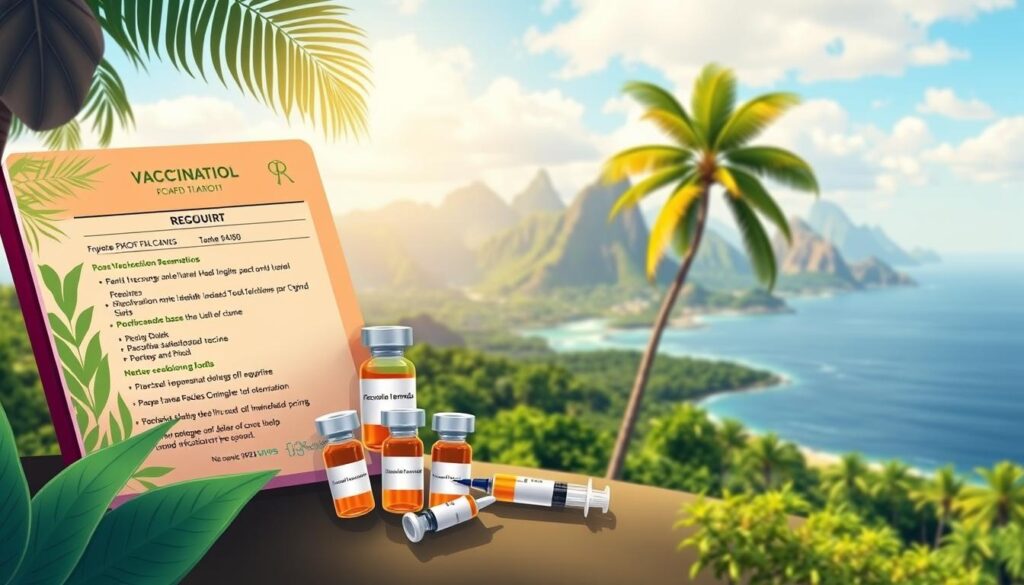
Thinking about health precautions before you go can really help. Knowing the south pacific vaccination requirements lets you travel with confidence. You’ll be ready for your adventure.
Understanding the Importance of Travel Vaccines
Travel vaccines are key to keeping you healthy on adventures in the South Pacific. Tropical areas have many infectious diseases. Vaccines like those for hepatitis, typhoid, and cholera help protect you.
Travelers without vaccines face a higher risk of serious illnesses. Health experts stress the importance of getting vaccinated. This helps prevent outbreaks and keeps you safe.
Getting vaccinated not only keeps you safe but also helps the community you visit. It shows you care about responsible travel. This way, you can enjoy your trip without worrying about preventable diseases.
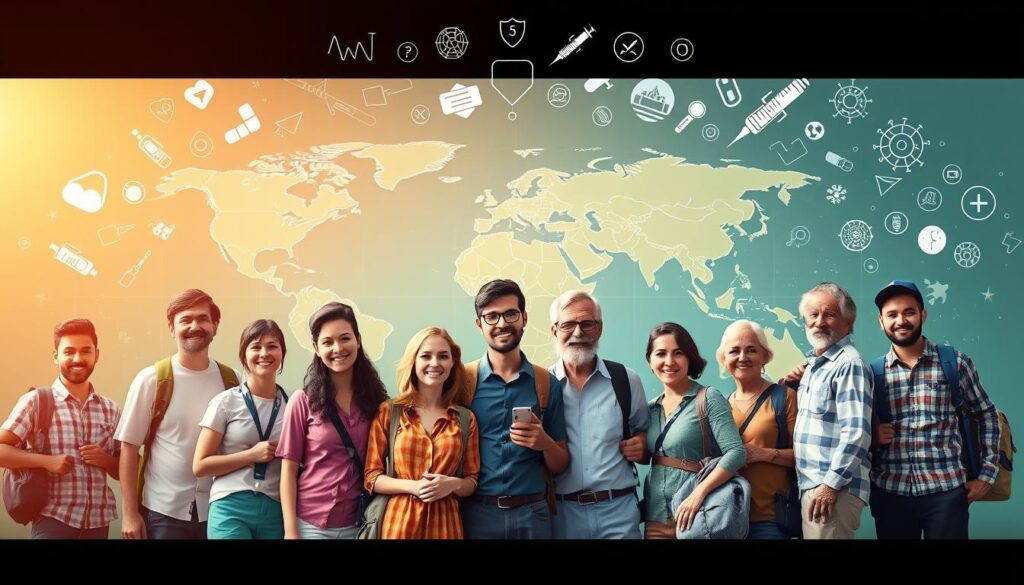
Recommended Vaccines for the South Pacific
Planning a trip to the South Pacific? Knowing the recommended vaccines is key to stay safe. Health groups like the WHO and CDC suggest certain vaccines for travelers. These shots not only protect you but also help stop diseases from spreading.
Hepatitis A and B
Hepatitis A spreads through bad food and water. Getting vaccinated is important to avoid serious liver problems. Hepatitis B is passed through bodily fluids, so it’s vital for longer stays or close contact. Both vaccines are a must for South Pacific travelers.
Typhoid and Cholera
Typhoid fever comes from tainted food and water. It’s more common in smaller cities and rural areas. Cholera is less common but also spreads through contaminated food and water. Vaccines are a good idea if you’ll be in these places.
Yellow Fever and Japanese Encephalitis
Yellow fever is a mosquito-borne virus, mainly found in certain islands. You might need a vaccine if you’re coming from an area where it’s common. Japanese encephalitis is rare but can be a risk in rural South Pacific areas. If you’ll be outdoors a lot or near farms, getting vaccinated is wise.
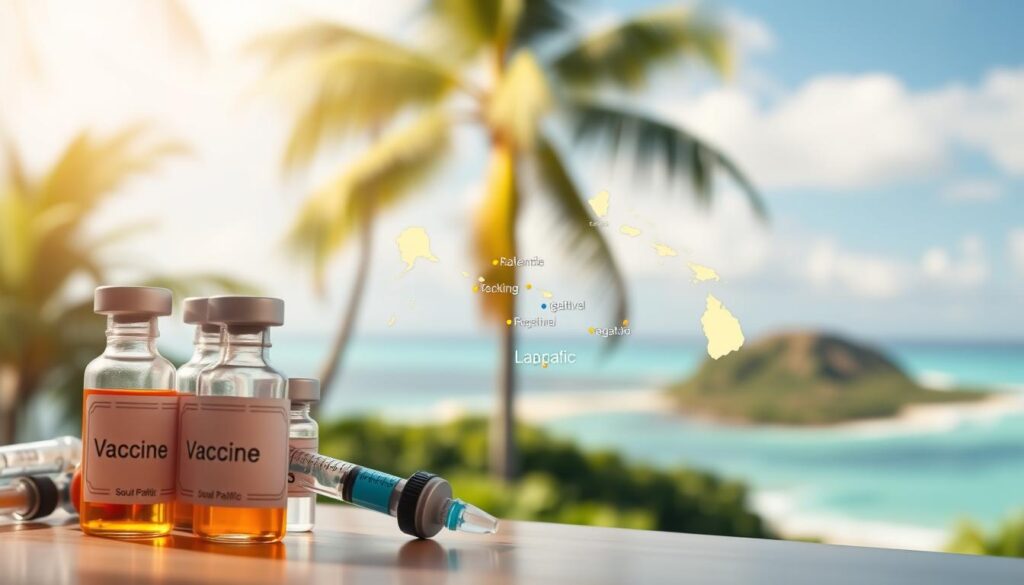
| Vaccine | Disease | Transmission | Recommended for |
|---|---|---|---|
| Hepatitis A | Liver Infection | Contaminated food/water | All travelers |
| Hepatitis B | Liver Infection | Bodily fluids | Long-term travelers |
| Typhoid | Fever | Contaminated food/water | Rural travelers |
| Cholera | Diarrheal Disease | Contaminated food/water | At-risk travelers |
| Yellow Fever | Viral Infection | Mosquito bites | Travelers to endemic areas |
| Japanese Encephalitis | Viral Encephalitis | Mosquito bites | Rural outdoor travelers |
Travel Vaccines for the South Pacific: What You Need Before You Go
Before you head to the South Pacific, knowing the pre-travel vaccinations you need is key. Several vaccines are important to keep you safe while you explore. This region is stunning, and you want to enjoy it without worry.
It’s wise to talk to your doctor at least six weeks before you go. This gives you time to plan and get any needed booster shots. Some vaccines, like Hepatitis A, need more than one shot, so plan ahead.
Also, check the travel vaccination requirements for your specific destination. The rules can change from island to island. For example, you might need a Yellow Fever vaccine if you’re coming from a high-risk area.
Getting ready by getting the right vaccines will make your trip better. Stay informed, stay safe, and make sure your shots are up to date before you leave.
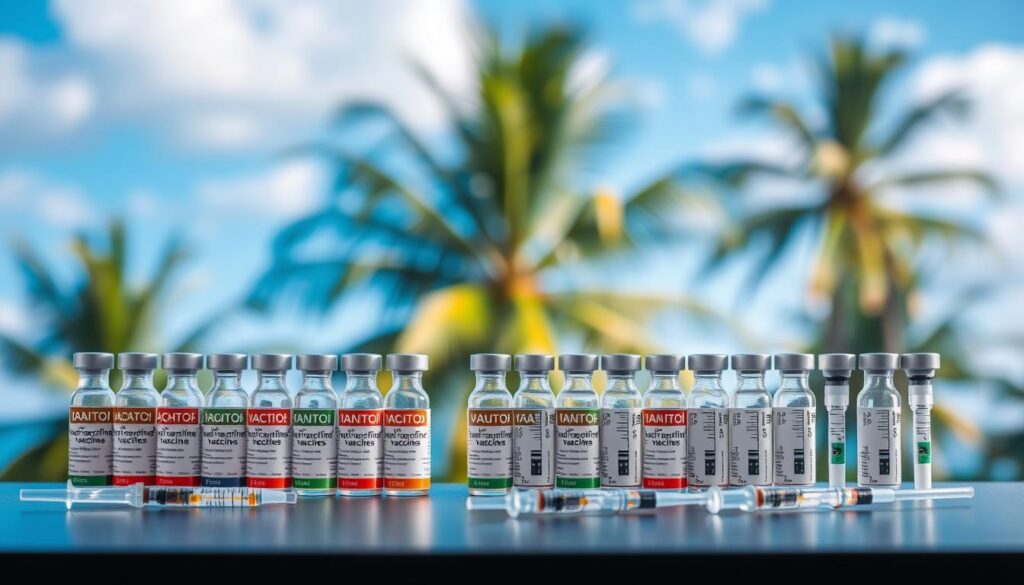
Routine Vaccination Considerations
Before you travel to the South Pacific, make sure you’re up-to-date on your vaccinations. This step is key to keeping you healthy and stopping diseases from spreading. Vaccines like MMR, Tdap, and polio are very important for trips to tropical areas where these diseases are more common.
Measles, Mumps, and Rubella (MMR)
If you were born after 1957, check your MMR vaccination status. Measles outbreaks have happened in many places, including some South Pacific islands. Getting vaccinated not only keeps you safe but also helps stop outbreaks. If you’re not sure if you’re vaccinated, get a booster shot before you go.
Tdap and Polio Vaccinations
Tdap vaccines protect against tetanus, diphtheria, and pertussis. Polio vaccinations keep you safe from poliomyelitis, which is found in some areas. It’s important to stay current on your vaccinations for safe travel. Talk to your doctor to make sure you’re up-to-date on these important shots, as the risk of getting sick is higher in crowded or dirty places.
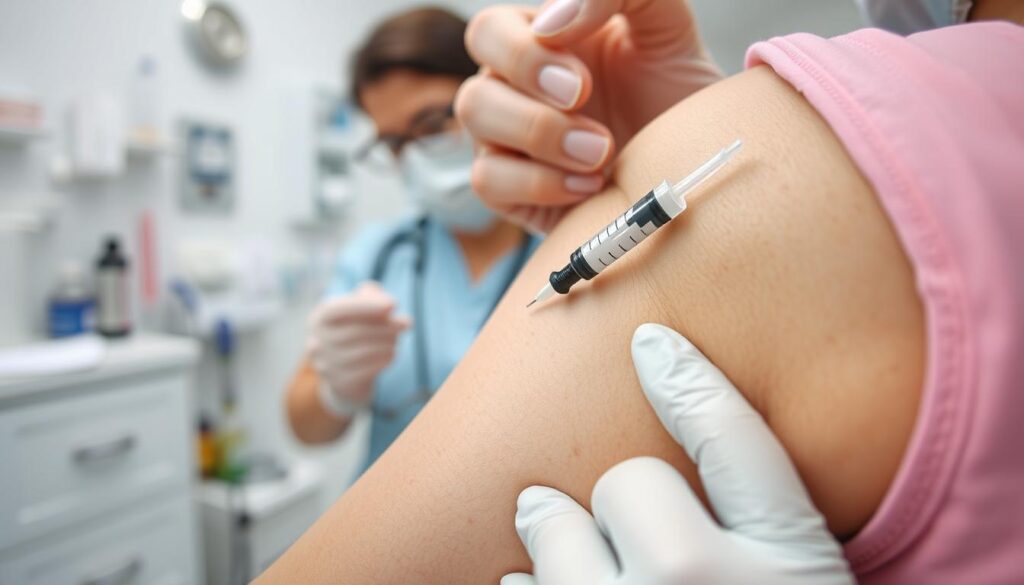
Additional Vaccination Recommendations
When you’re planning a trip to the South Pacific, getting extra vaccinations is key. These shots keep you safe and help the places you visit stay healthy too. Knowing which shots you need can make your trip safer and more fun.
Influenza and Pneumonia
Flu vaccines are a must in warm places because the flu can be worse there. Pneumonia shots protect you from infections that might ruin your trip. Most people going to the South Pacific should get these travel immunizations for south pacific. They help you stay healthy while you explore.
Rabies and Travel Immunization Specifics
Rabies is a big worry, mainly if you’re outdoors or around animals. If you’ll be in rural areas, getting a rabies shot is a good idea. Remember, these additional vaccinations for south pacific travel are important for your health. Always check with doctors for the best advice before you go.
Understanding South Pacific Vaccination Requirements
Before you head to the South Pacific, it’s key to know the vaccination rules for your destination. Each country has its own rules about the shots you need to get in. Knowing these rules helps you travel smoothly and stay safe.
Entry requirements based on itinerary
Your travel plans affect the shots you need. Some places require proof of certain vaccinations, like yellow fever. It’s smart to check each country’s rules early. This way, you can enter easily and keep everyone healthy.
Staying updated on vaccination protocols
Travel health advice can change often. It’s important to keep up with the latest vaccination advice. The CDC and WHO are great sources for the latest info. They help make your trip safe and worry-free.
Travel Health Advice for the South Pacific
When you travel to the South Pacific, keeping your health and safety in mind is key. Start by making a travel health kit. It should have basic first-aid items, any medicines you need, insect repellent, and sunscreen. Knowing how to stay healthy on your trip is important, not just what you bring.
It’s also vital to know where to find medical help. Look up the nearest hospitals or clinics at your destination. Having this information ready can help if you get sick while traveling. Also, check reliable sources for the latest health risks for your trip.
Preventing health issues is a big part of staying safe. Eat well-cooked foods and drink bottled or treated water. Wear long sleeves and use insect repellent to avoid mosquito bites. These steps help make your trip to the South Pacific worry-free.
Pre-Travel Health Recommendations
Getting ready for a trip to the South Pacific? It’s key to follow health tips to stay safe and healthy. Paying attention to food and water safety can stop you from getting sick. Also, knowing how to dodge mosquito-borne diseases makes your trip better.
Health tips for food and water safety
Food and water safety is a big deal when you travel. Here are some tips to help prevent tropical diseases:
- Drink bottled water instead of tap water to avoid contamination.
- Avoid ice cubes in drinks, as they may be made from unsafe water.
- Choose freshly prepared foods and avoid street vendors when possible.
- Peel fruits and eat cooked vegetables to minimize risk.
Preventing mosquito-borne diseases
It’s important to protect yourself from mosquito-borne diseases in the South Pacific. Follow these steps for effective disease prevention:
- Apply insect repellent containing DEET or Picaridin on exposed skin.
- Wear long-sleeved shirts and long pants to reduce mosquito bites.
- Use bed nets treated with insecticide if you plan to stay in open accommodations.
- Stay in air-conditioned or well-screened places whenever possible.
Consultation with a Travel Health Specialist
Before you head to the South Pacific, getting a consultation with a health expert is key. Travel medicine in the South Pacific deals with diseases and pathogens found there. A health specialist will look at your health history and give you advice for your trip.
Meeting with a travel health expert helps you plan your vaccinations. They’ll tell you which shots you need to stay safe. This way, you know exactly what to get, based on where you’re going and your health.
Also, a health consultation can connect you with important resources. You’ll learn about healthcare in your destination, emergency numbers, and tips for staying healthy while traveling. Getting a travel medicine consultation helps you prepare better and enjoy your trip more.
Conclusion
Traveling to the South Pacific is exciting, but keeping your health in mind is key. Getting the right vaccinations is important for your safety and well-being. The health tips in this article are essential for a safe trip.
Before you go, learn about the vaccines you need. This step is important for staying healthy and enjoying your trip. Knowing about vaccinations and health advice can greatly improve your journey.
Your health is very important. Talking to a travel health expert can give you tailored advice. With the right preparation, you can enjoy the South Pacific’s beauty safely.
